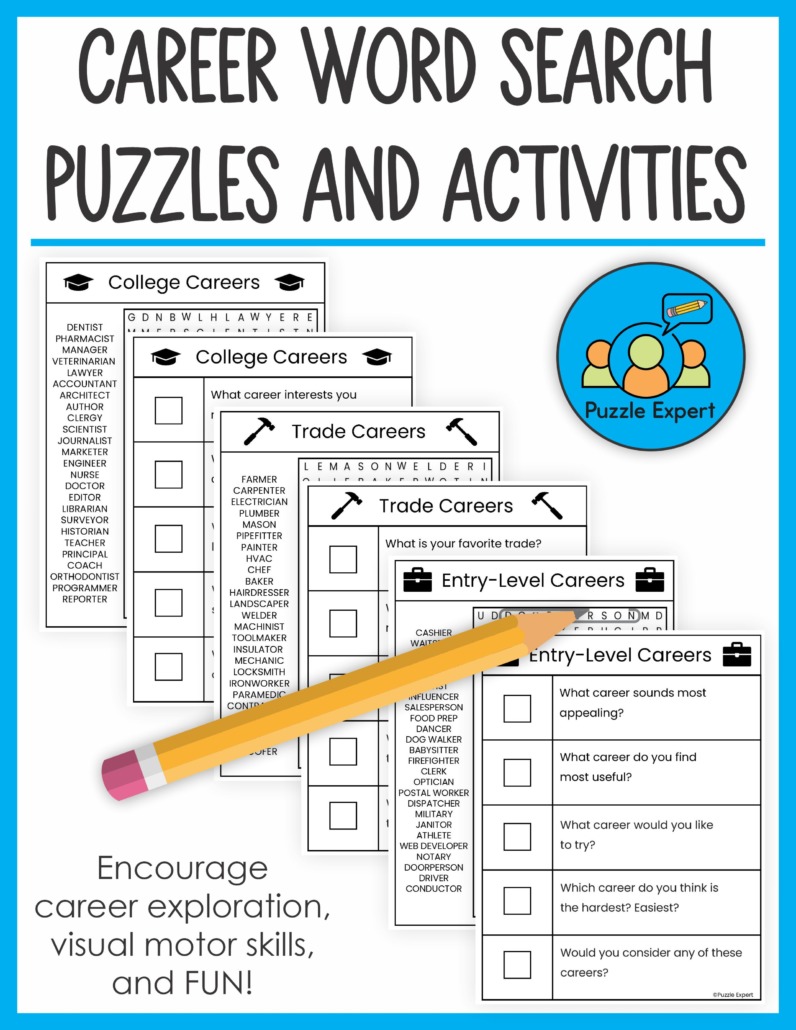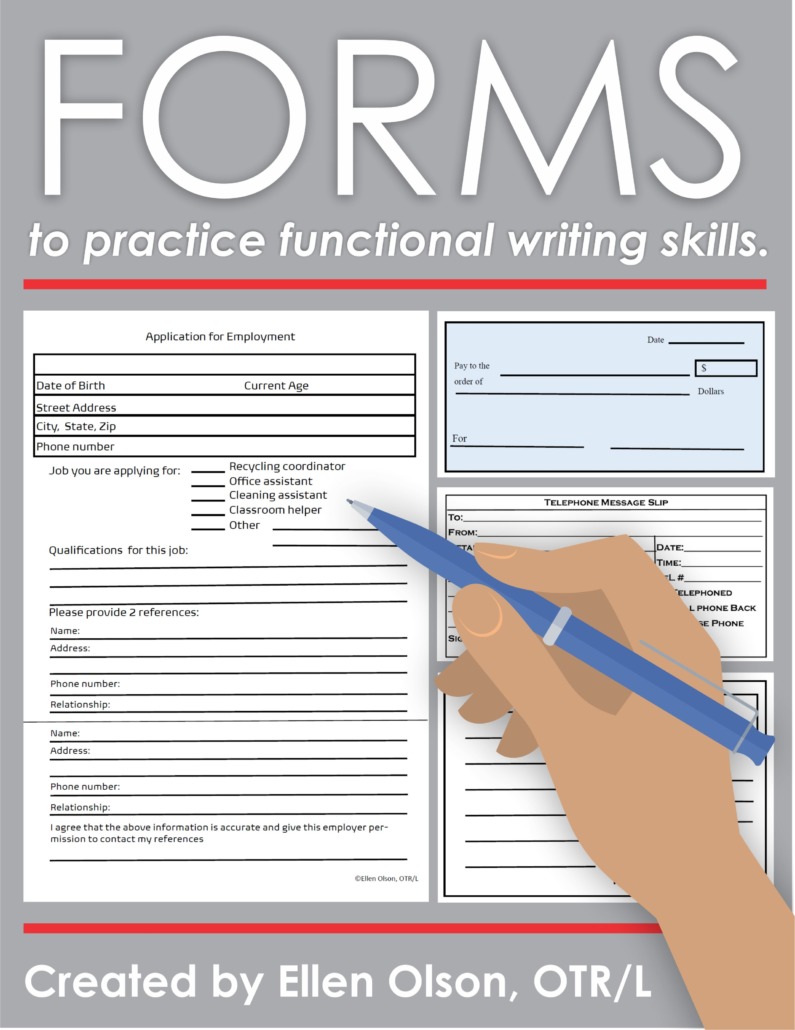Interest Inventory for Students

Do you want to encourage your students to find their interests and explore careers? A good way to start is by completing an interest inventory for students. This can help each individual student identify potential careers and hobbies.
There are many different types of student surveys when it comes to career ideas and suggestions. This student interest survey is based on the idea that most careers can be placed into six types of work environments. Based on a student’s personality traits, learning style, natural talents, life experiences, and preferred school subjects, these types of career interest surveys can be one of the easiest ways to get started.
You can download a free printable of this article on the bottom of this post.
THE SIX KINDS OF CAREERS
When it comes to choosing a career, there are many different ways you can take to decide on a career pathways. According to Holland’s Theory of Career Choice, there are six main types of careers that people tend to gravitate towards. These career clusters of interest are Realistic, Investigative, Artistic, Social, Enterprising and Conventional.
Realistic
Realistic careers are those that involve working with your hands and often involve physical labor. Examples of a realistic work environment may include working as an electrician, carpenter, military service, or mechanic.
Investigative
Investigative careers are those that require knowledge and often involve research or science. Examples of an investigative work environment may include working as a journalist, doctor, or scientist.
Artistic
Artistic careers are those that allow you to express your creativity and often involve design or performance. Examples of an artistic work environment may include working as a musician, actor or artist.
Social careers
Social careers are those that involve working with people and often involve teaching or counseling. Examples of a social work environment may include working as english teachers, language teachers, nurse or counselors.
Enterprising
Enterprising careers are those that involve leadership and often involve sales or management. Examples of an enterprising work environment may include working as a business owner, manager or salesperson.
Conventional
Conventional careers are those that require organization and often involve clerical work or administration. Examples of conventional work environments may include working as an office administrator, bookkeeper or secretary
By using an interest inventory for students, they can understand their own preferences, narrow down their options and choose a career that is best suited for them.
THE IMPORTANCE OF AN INTEREST INVENTORY FOR STUDENTS
Interest inventories can be extremely helpful for students who are trying to choose a major or career path. By taking an inventory, students can learn about their own strengths, interests, skills, and values.
This is a great way to find out specific things and student interests that can then be used to identify potential majors and careers that are a good fit.
Interest inventories can help students to understand themselves better and to set realistic expectations for their future. For example, a student who is interested in helping others may want to consider a career in social work. A student who is interested in machines and technology may want to consider a career in engineering. By taking an interest inventory, students can explore their options and make the best choices for their future.
Think outside the box! In addition to helping students choose a major or career path, interest inventories can also be used to help with student choice for extracurricular activities, and developing goals.
60 ACTIVITIES THAT STUDENTS DO TO DETERMINE THEIR INTERESTS
There are plenty of activities that students do already that can help determine their preferences to guide their career exploration. This activity list can be a career guidance tool for elementary students, middle school students, high school students and even college students!
One fun way to learn about careers and jobs is this Career Word Search and Activities Packet.

Career Word Search and Activities Packet
REALISTIC ACTIVITIES FOR KIDS
1. Taking apart and reassembling electronics
2. Building with construction toys
3. Drawing, painting, or sculpting
4. Playing with action figures or dolls
5. Playing sports
6. Collecting bugs, leaves, or rocks
7. Doing puzzles
8. Riding a bike or skateboard
9. Planting a garden
10. Caring for a favorite animal or pets
INVESTIGATIVE ACTIVITIES FOR KIDS
1. Reading books or magazines
2. Conducting experiments
3. Going on nature walks
4. Building models
5. Playing chess or other strategy games
6. Taking things apart to see how they work
7. Use a magnifying glass to examine small objects
8. Look at the stars with a telescope
9. Investigate how things are made
10. Keep a nature journal
ARTISTIC ACTIVITIES FOR KIDS
1. Playing music
2. Singing
3. Writing stories or poems
4. Acting
5. Dancing
6. Making jewelry or other crafts
7. Taking photographs
8. Filming videos
9. Designing clothes or costumes
10. Decorating rooms or making paintings
SOCIAL ACTIVITIES FOR KIDS
1. Helping others
2. Volunteering
3. Joining a club
4. Going to parties
5. Having sleepovers
6. Going on outings with friends
7. Talking on the phone
8. Playing video games together
9. Working together on a team
10. Texting or chatting online
ENTERPRISING ACTIVITIES FOR KIDS
1. Setting up a lemonade stand
2. Having a yard sale
3. Creating a new game or sport
4. Planning parties
5. Organizing outings with friends
6. Creating and selling arts and crafts
7. Leading games with friends
8. Starting a band
9. Writing a neighborhood newsletter
10. Babysitting for families in the community
CONVENTIONAL ACTIVITIES FOR KIDS
1. Doing chores around the house
2. Helping to cook dinner
3. Organizing toys or clothes
4. Filing papers
5. Using the family computer
6. Paying bills or balancing the checkbook
7. Going grocery shopping
8. Counting money
9. Answering the door or telephone
10. Sorting mail

Forms for Functional Writing Practice
EXAMPLES – INTEREST INVENTORY FOR STUDENTS
Here are 30 questions for your students to try answering to help to determine their interests.
SPECIFIC QUESTIONS
1. Do you like working with your hands?
2. Do you like working with tools?
3. Do you like building things?
4. Do you like being outdoors?
5. Do you like working with animals?
6. Do you like caring for people?
7. Do you like helping others?
8. Do you like working with numbers?
9. Do you like working with computers?
10. Do you like researching things?
11. Do you like writing?
12. Do you like painting or drawing?
13. Do you like music?
14. Do you like acting or performing?
15. Do you like being around people?
16. Do you like being by yourself?
17. Do you like working in a group?
18. Do you like leading others?
19. Do you like following directions?
20. Do you like organizing things?
OPEN ENDED QUESTIONS
21. What are some other things that interest you?
22. What are some things that you’re good at?
23. What are some things that you enjoy doing?
24. What are some things that make you happy?
25. What are some things that make you feel fulfilled?
26. What are some things that make you feel successful?
27. What are some things that give you a sense of accomplishment?
28. What are some things that make you feel proud?
29. What are some things that make you feel good about yourself?
30. What are some things that make you feel confident?

Life Skills Checklists
SUGGESTIONS TO USE THE CAREER INTERESTS SURVEY IN THE CLASSROOM
Here are some suggestions for when and how to use the student interest inventories:
- Record short answers to the questions above to think deeper about a students’ interests
- Ask younger students to identify if they LIKE or DISLIKE the activities that are listed. You could use happy or sad faces for them to choose from.
- Have the students work in a small group to discuss their likes and dislikes
- Use the questions as conversation starters to help students think of different leisure activities they might like as well.
MORE IDEAS – INTEREST INVENTORY FOR STUDENTS
Career Cluster Student Interest Survey – The Student Interest Survey for Career Clusters® is a career guidance tool that allows students to respond to questions and identify the top three Career Clusters of interest based on their responses.
Career Interest Inventory Picture Version – This is a great starting point for younger children or special education students
THE IMPORTANCE OF FINDING A CAREER THAT MATCHES YOUR INTERESTS
It can be difficult for students to figure out what they want to do with their lives. With so many options and so much pressure, it’s no wonder that many students end up in jobs that they don’t enjoy.
An Interest inventory for students can help them identify their strengths and weaknesses, as well as the areas in which they are most interested. This information can then be used to explore different careers and find the one that is the best fit. Students need to take plenty of time to explore their interests and find a career that is the right match for them.



